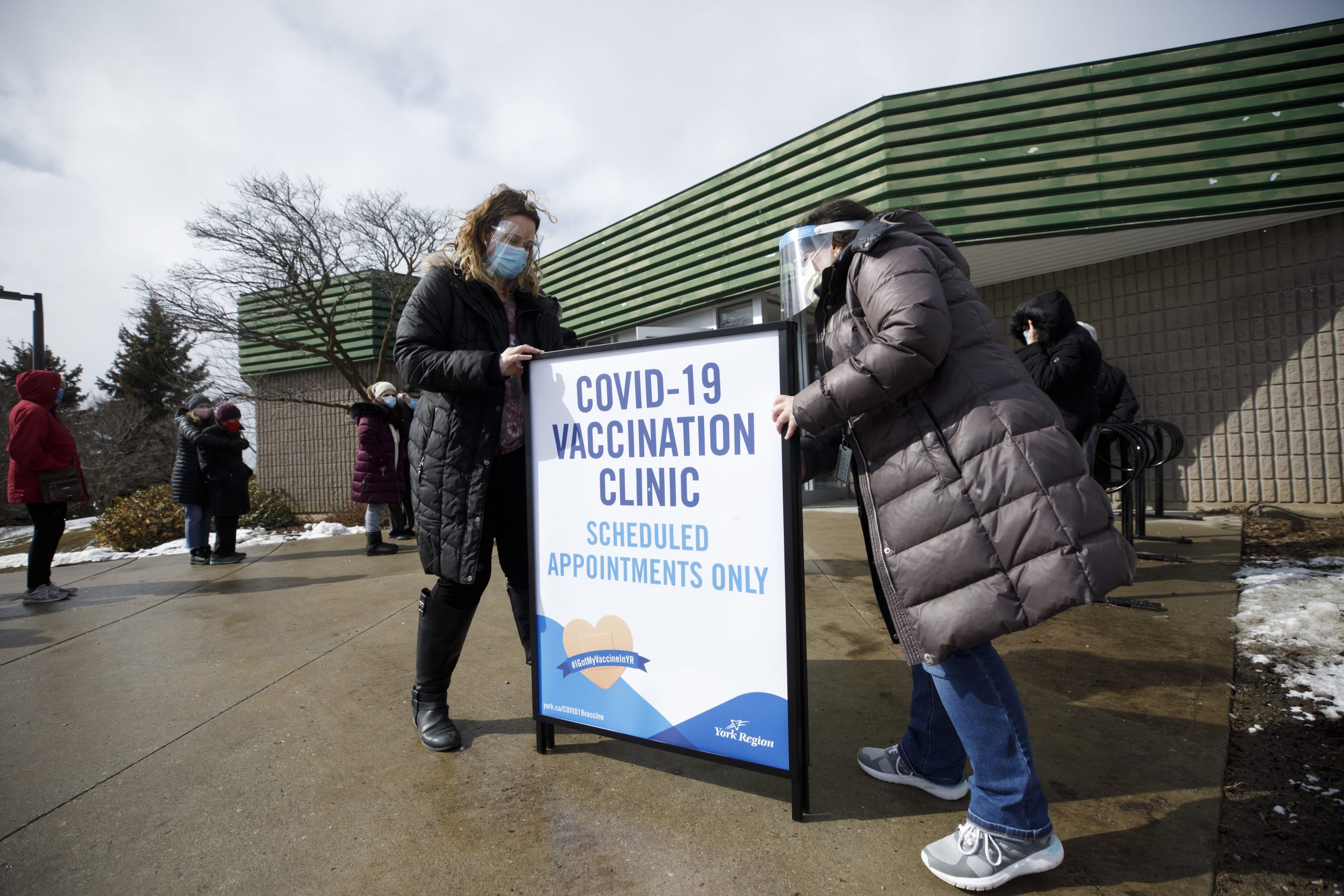Anyone who already has an appointment can rebook. Any appointments already booked will not be cancelled unless a new and earlier appointment is confimed.
The region is just under two weeks ahead of the province’s plan to allow residents to book their shots at an earlier date.
Ontario will be allowing those 70+ to book their COVID-19 second doses as of June 14.
High risk health care workers, those with the highest risk health conditions and Indigenous individuals are also eligible for their second doses.
As of May 26, 70 per cent of adults in York have been partially vaccinated and 4.2 per cent have been fully vaccinated.
In Ontario, 66 per cent of all eligible residents have received their first COVID-19 vaccine.
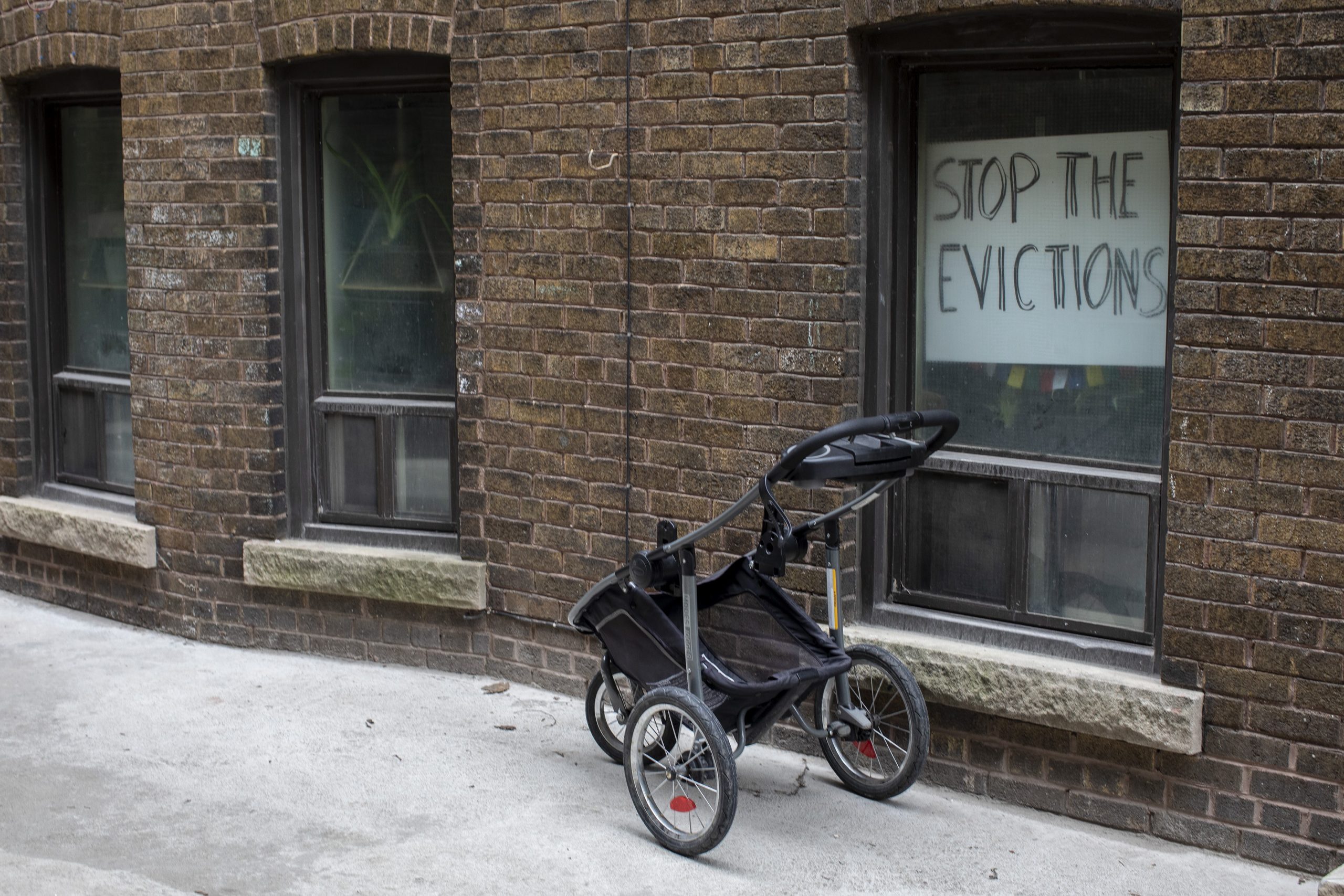
Housing and tenant advocates are calling on Ontario to reinstate a ban on residential evictions that lifted Wednesday as the province’s stay-at-home order expired.
They argued that losing housing during the pandemic would put lives at risk, and suggested evictions be suspended as long as provincial COVID-19 restrictions remained.
“Keeping everyone housed is one of the most important public health measures during a pandemic,” ACORN Canada, an advocacy group for low and moderate-income families, said in a statement. “We know that the pandemic is far from over.”
The government halted all residential evictions when it imposed the stay-at-home order amid soaring COVID-19 cases in April. While that order ended Wednesday, along with the eviction ban, the vast majority of public health restrictions remain.
Emina Gamulin, a tenant facing an eviction order, said the lifting of the ban was highly concerning.
“It’s been stressful,” she said, adding that a number of her neighbors are also facing eviction orders and are still without work. “For those people who have lost work, it’s going to be very hard for them to catch up.”
Eviction hearings have been ongoing even while the ban has been in place. The end of the ban means sheriffs can once more enforce eviction orders.
Tenant advocacy group Keep Your Rent, which Gamulin is a member of, said the end of the ban will likely result in a wave of evictions.
One Toronto legal clinic said the lifting of the eviction ban suggested the province did not have its priorities straight.
“The province’s decision to now continue nearly all public health restrictions except the suspension of eviction enforcement represents a clear prioritization of landlords’ financial interests over the health and safety of low-income and racialized tenants, their families, and their communities,” Lawyer Benjamin Ries of Downtown Legal Services said in a statement.
Ries also suggested Toronto’s top doctor could suspend residential evictions in the city if she thinks such measures are necessary to prevent the spread of COVID-19, hospitalization, and death.
But Dr. Eileen De Villa said her power to act on the issue under the Health Protection and Promotion Act was limited.
“There’s not a lot of latitude for medical officers of health,” she said.
A spokesman for the ministry of municipal affairs and housing said the government has taken action to protect and support tenants, including freezing rents for the vast majority of renters and providing municipalities with $765 million to support housing and homelessness programs.
“Throughout the pandemic, the government has encouraged landlords and tenants to work together and the vast majority have done so,” spokesman Matt Carter said.
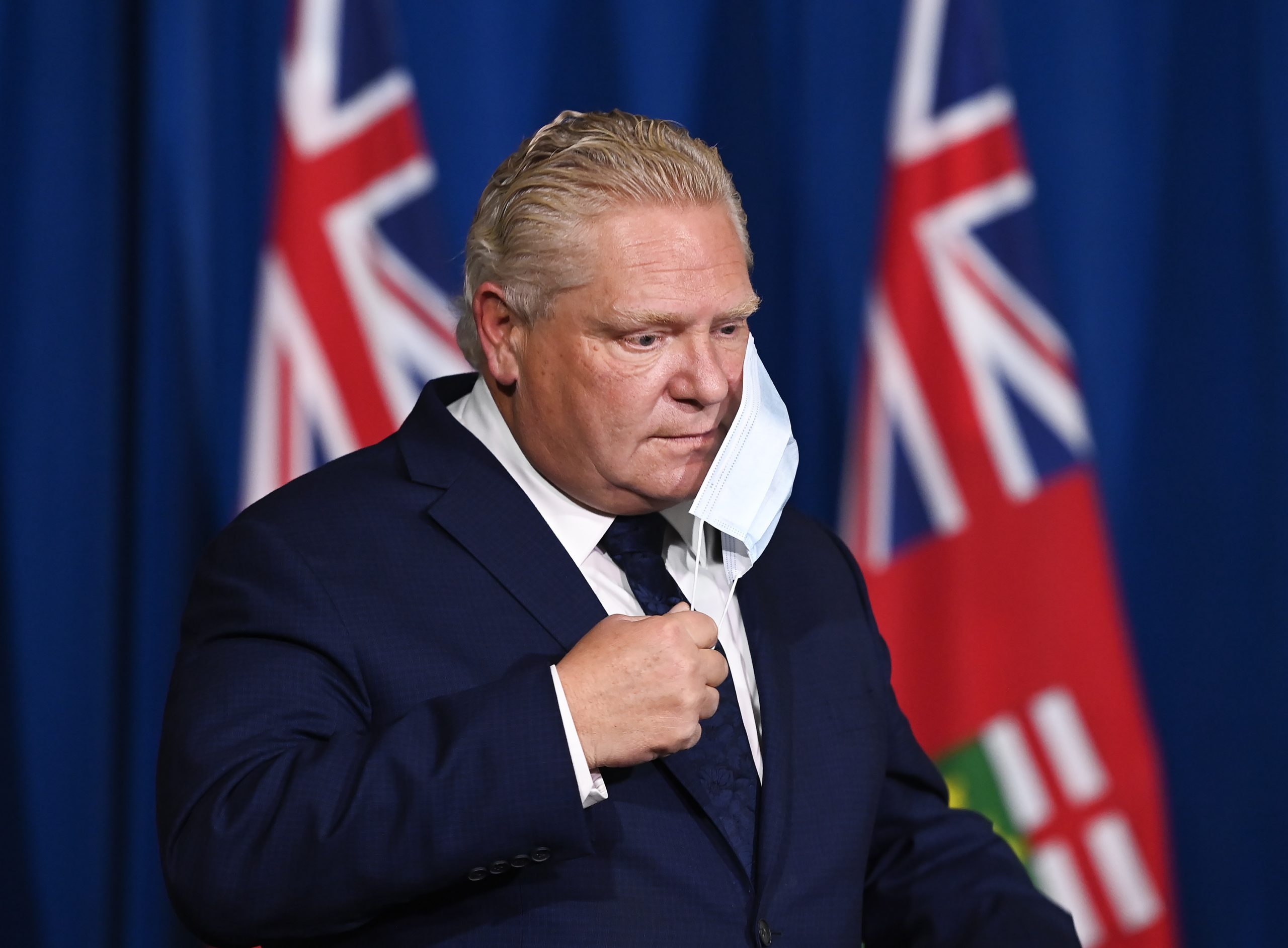
The Ontario government confirms all COVID-19 restrictions will remain in place when the stay-at-home order expires Wednesday until the province enters Stage 1 of its reopening plan.
Currently, Stage 1 is expected to go into effect on June 14.
The restrictions include a ban on indoor gatherings, restricting non-essential retail to curbside pick-up and restricting restaurants and bars to take-out and delivery.
Outdoor recreation and outdoor gatherings of up to five people will still be allowed.
Emergency orders that enforce the restrictions have been extended to June 16, except for the emergency order banning residential evictions. The ban on residential evictions will expire on June 2.
The stay-at-home order, which has been in effect since April 7, requires all Ontario residents to remain at home except for essential purposes set out in the order.
Premier Doug Ford is expected to make an announcement on whether schools will reopen this school year in the next couple days.
Sources say Ford will meet with his cabinet on Wednesday and it remains unlikely a decision comes before then.
The Canadian Federation of Independent Business has called on the government to adjust their reopening plan and allow the economy to open up immediately.
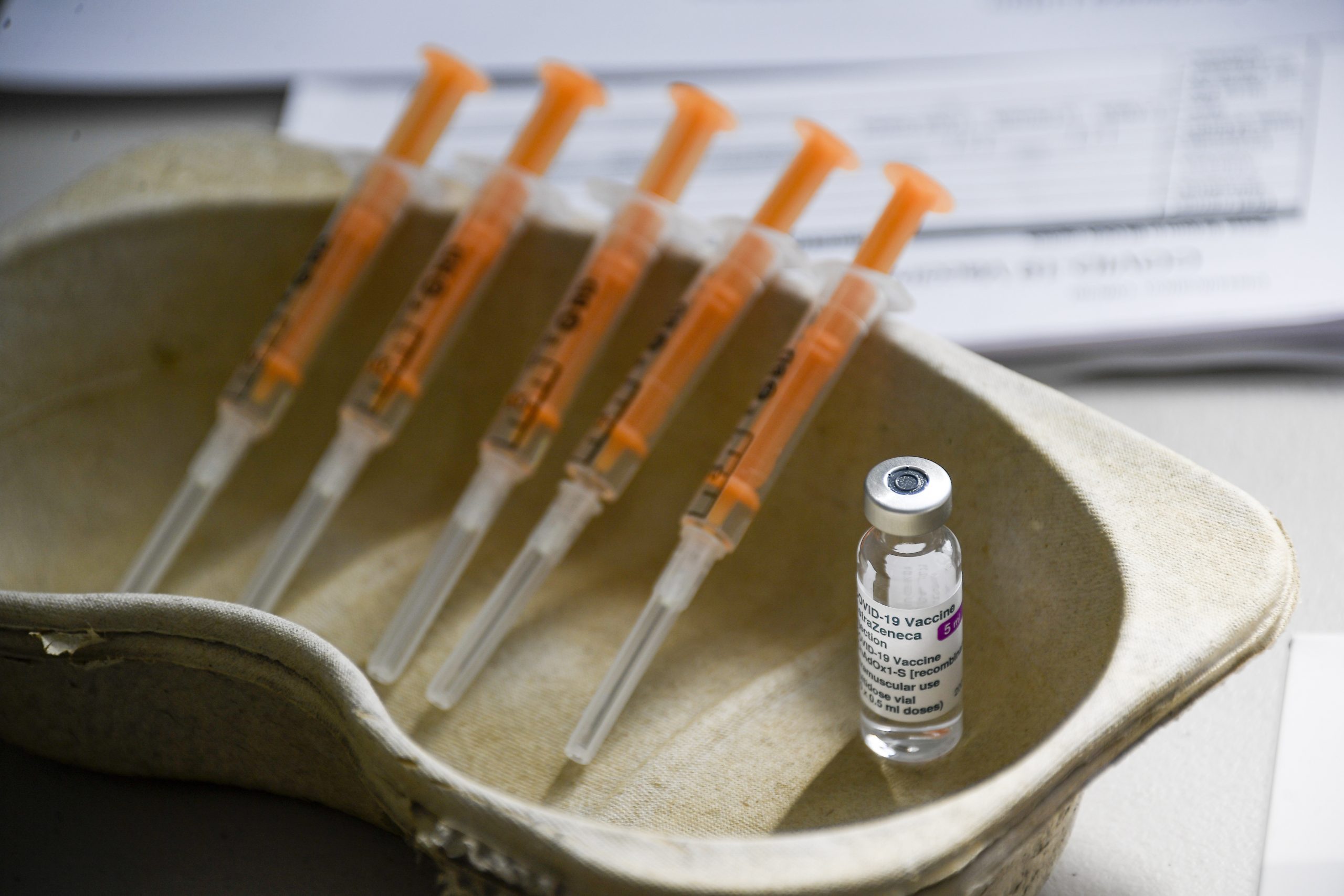
OTTAWA – Canada’s vaccine panel has updated its recommendation on mixing different kinds of COVID-19 vaccines.
The National Advisory Committee on Immunization (NACI) said Tuesday that people who have been given the viral-vector AstraZeneca shot can be given a Pfizer or Moderna mRNA shot as their second shots.
However, NACI says that if you had an mRNA shot as your first dose, you should be given an mRNA as your second shot.
Pfizer and Moderna can be interchanged if the same vaccine is not available as a second shot.
The committee says while you can mix and match if needed, you should still try to get the same vaccine for your second shot that you did for your first.
A study in the United Kingdom reported last month that mixing AstraZeneca and Pfizer-BioNTech as first and second doses led to more reports of short-lived side-effects like fevers and fatigue but was otherwise safe.
The Spanish study concluded a second dose of Pfizer after a first dose of AstraZeneca produced more than twice the antibodies as a second dose of AstraZeneca.
All provinces paused the use of AstraZeneca for first doses in May as reports of vaccine-induced blood clots rose, but are anxiously waiting for the NACI advice on what to do with second doses.
Manitoba didn’t wait for the advice, with health officials in that province announcing Monday they would start offering Pfizer-BioNTech or Moderna as a second dose to AstraZeneca recipients.
READ NACI’S FULL REPORT:
There are 41 confirmed or suspected cases of vaccine-induced blood clots following an AstraZeneca vaccination in Canada, including five deaths.
Almost 2.2 million Canadians received the vaccine for their first dose, out of 21.8 million people now vaccinated with at least one dose.
The vaccine board also says that as people across the country get their second shots as rollout expands, provinces should prioritize high-risk groups, like the elderly and people with underlying conditions.
But, while NACI says second shots can be given as soon as possible, it still encourages provinces to extend the dose intervals where possible to make sure supply doesn’t dry up too quickly.
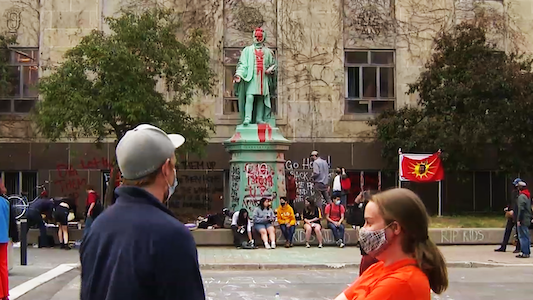
The statue of Egerton Ryerson outside of the Toronto university has been defaced once again after the bodies and remains of 215 children were found buried on the grounds of a residential school in Kamloops, British Columbia.
The statue has been a point of contention for several years, with Indigenous student groups and other activists demanding it be removed given Ryerson’s role in designing the model for residential schools.
Ryerson was an engineer of Canada’s residential school system, intended to remove Indigenous children from the influence of their culture and make them conform to white Canadian societal norms.
The statue was covered in red paint and graffiti that reads “show the world how many of us you have murdered”, “dig them up” and “land back.”
Mayor John Tory opened the meeting of his executive committee Tuesday with comments about the 215 Indigenous children and residential schools.
“I think what’s important for us to focus on is the trauma being experienced, the renewed trauma, the repeated trauma now being experienced by the survivors and by their families and by the Indigenous people in Canada,” he said.
Tory, who studied Canadian history in university, says the system is an under-discussed part of the country’s history, adding that he hopes the current curriculum has changed.
On Monday, a small group of people rallied in front of the statue on campus to stage a sit-in mourning the 215 children found buried on the BC school’s grounds.
Ryerson was a Methodist Minister, educator and politician in the 1800s.
In June 2020, Ryerson graduate Maaz Khan started a petition to have the statue removed.
The Ryerson statue, and statues of other historical figures both in Canada and the U.S., have been a common target of protesters in the last year or so.
In July 2020, Toronto police charged three people with mischief and conspiracy to commit a summary offence after pink paint was splashed on the Ryerson statue, along with statues of John A. Macdonald and King Edward VII.
In late August, Prime Minister Justin Trudeau said he was “profoundly disappointed” after vandals in Montreal toppled and beheaded a statue of John A. Macdonald.
University’s journalism program votes to change name of masthead publications
The university announced on Tuesday that it has voted to change the names of its masthead publications in time for the new academic year.
As such, the school’s well known publication “The Ryersonian,” will be no more.
“The School’s decision to rename the publications came following a unanimous vote at our School Council meeting on May 18, but it was a process that began last fall,” said the university.
“Last year, journalism students started the conversation about renaming the school masthead publications. They felt the horrific legacy of the residential school system, declared cultural genocide by the Truth and Reconciliation Commission and detailed in its The Survivors Speak report, was too great to continue using the Ryerson name. Egerton Ryerson, for whom the school titles were named, was indisputably one of the chief architects of the system.”
The school says it “does not take this decision lightly,” adding that students understand the responsibilities that come with it.
“We are proud of the students, alumni and faculty who have worked under the banners of our masthead publications for many decades. Plans are being made for that archival work to be preserved under those award-winning titles. Those articles and photos will not be wiped from history, but history they are.”
The Ryersonian is staffed and operated by final-year undergraduate and graduate students in the university’s School of Journalism.
With files from Dilshad Burman

Educators and students at many Catholic school boards across the province raised the Pride flag for the first time ever today, including Catholic boards in Durham, Niagara, Ottawa and Toronto.
Advocates and members of the LGBTQ2S+ community say it’s a symbolic gesture and a call to action.
“It was a very emotional reaction watching the flag-raising ceremony today,” said Kyle Iannuzzi, a former student trustee for the Toronto Catholic District School Board (TCDSB).
The TCDSB hosted its first ever official celebration to mark the start of Pride Month on Tuesday.
“We demonstrate living the gospel values of love, inclusion, compassion and care for all, including 2SLGBTQ2+,” Brendan Browne, the board’s director of education, said at Tuesday morning’s ceremony.
Iannuzzi, who has been vocal about 2sLGBTQ+ inclusion at Catholic boards, said while it’s important to celebrate this moment, there is much work that still to be done to support queer students at Catholic schools.
“Now we’re saying in schools that these places are safe and you can have those conversations, but we have policy and curriculum that contradict that,” he noted, adding advocates have been calling for Ontario’s Ministry of Education to centralize support and resources for LGBTQ2S+ students, staff, and families.
“We’ve been calling for an audit since 2019 – to find out whether this inclusion is happening,” he explained.
Tuesday’s moment was also met with anti-LGBTQ2S+ protests at eight Catholic boards.
Vehicles circled outside the headquarters of the TCDSB in protest of the Pride flags on display. At Halton’s Catholic board, protestors spoke out against what they called, “approved LGBT indoctrination,” though the board recently voted against flying the Pride flag.
Demonstrators were met with counter-protesters, calling on the board to instead support LGBTQ2S+ students and fly the flag.
Out of Ontario’s 37 Catholic boards, at least 16 of them have publicly said they’re celebrating Pride this month. Two Catholic boards, Halton and Hamilton-Wentworth, re-affirmed this year that they would not be flying the flag.
Boards’ recent decisions in favour of the gesture have not been uncontroversial.
“When the TCDSB voted to raise the flag, we saw presentations that were homophobic,” said Iannuzzi. “I remember one of the delegates saying gay people are suffering from themselves, from their conditions essentially.”
The TCDSB’s director of education noted today that the board’s flag raising ceremony is just a start.
“We acknowledge there’s much more,” says Brown. “We are committed to further engagement with TCDSB’s LGBTQ2S+ advisory committee to supporting students, staff and families.”
Pride flags will be on display at TCDSB schools for all of June. All flags at board properties have also been lowered to half-mast in memory of the 215 children who were discovered last week at a mass grave site at the Catholic-run Kamloops Indian Residential School.
As a student, Iannuzzi says he never saw his identity reflected at his school.
“It was still very much a hidden part of my life, so much so I didn’t appreciate the fact the flag wasn’t there and available for me at school,” he says. “I can’t even picture what my life would be like today if I had been able to come out to myself earlier in life.”
Ontario Catholic School Boards Celebrating Pride Month 2021
CityNews reviewed Ontario’s 37 Catholic school boards. As of June 1, 2021, 16 had publicly stated they were celebrating Pride.
- Bruce Grey Catholic District School Board
- Catholic District School Board of Eastern Ontario
- Dufferin-Peel Catholic District School Board
- Durham Catholic District School Board
- Conseil scolaire catholique Franco-Nord
- Kenora Catholic DSB
- MonAvenir Conseil scolaire catholique
- Niagara Catholic DSB
- Ottawa Catholic School Board
- Simcoe Muskoka Catholic District School Board
- Thunder Bay Catholic District School Board
- Toronto Catholic District School Board
- Waterloo Catholic District School Board
- Wellington Catholic District School Board
- Windsor-Essex Catholic District School Board
- York Catholic District School Board

The Canadiens beat the odds and are off to the second round of the playoffs.
The Maple Leafs, meanwhile, are facing more uncomfortable questions following another post-season disaster.
Carey Price made 30 saves as Montreal came back from a 3-1 series deficit to beat Toronto 3-1 on Monday in Game 7 of a roller-coaster Original Six matchup.
Brendan Gallagher, Corey Perry and Tyler Toffoli, into an empty net, scored for the Canadiens. The visitors won a series after trailing 3-1 for the third time in franchise history. Eric Staal had two assists.
The Leafs, who haven’t advanced in the post-season since 2004 and won three of the first four games against the Canadiens before Montreal took two straight in overtime to force the all-or-nothing showdown, got a late goal from William Nylander.
Jack Campbell stopped 20 shots.
Montreal, which moved on to the second round for the first time since 2015, will take on Winnipeg after the Jets registered a surprising sweep of Connor McDavid’s Edmonton Oilers in the Canadian-based North Division’s other series. Game 1 goes Wednesday at Bell MTS Place in the Manitoba capital.
The Leafs, who never led on the scoreboard after going up 3-1 in the series, hosted 550 fully vaccinated health-care workers inside the 19,800-seat Scotiabank Arena to watch Game 7 after getting a thumbs up from the provincial government. The Canadiens welcomed 2,500 ticket-buying fans at Game 6 on Saturday at the Bell Centre — the first NHL crowd in this country since the start of the COVID-19 pandemic in March 2020.
Following a tentative first period, Montreal opened the scoring at 3:02 of the second on a sequence that started with a turnover by Mitch Marner at the offensive blue line. The Canadiens headed the other way, and Gallagher snapped his first goal since April 1 after missing six weeks with a broken thumb on a shot Campbell will want back through the five-hole.
The Leafs nearly tied it moments later when Price stopped Zach Hyman in tight before Auston Matthews ripped a shot off the post on a 2-on-1.
But the visitors would go up by two at 15:25 when Nick Suzuki’s shot on a power play went off Perry in front for the veteran winger’s second in as many games as Montreal struck on the man advantage for the third time in two contests after going 0 for 15 to start the series.
The Leafs, who finished 18 points ahead of the Canadiens in this year’s 56-game campaign and haven’t won the Stanley Cup since 1967, got a power play to start the third, but Price was there to deny Hyman on a redirect at the side of the goal.
Toronto pushed as the period wore on, but Price there to again foil Hyman off a behind-the-back pass from Matthews.
The Montreal goaltender was there again to thwart both Nylander and Matthews with massive stops on another Toronto man advantage with under nine minutes to go in regulation.
The home side pulled Campbell with 3:35 left, but a team that battled back from two-goal deficits in both Games 5 and 6 saw their hopes dashed when Toffoli scored into an empty net just over a minute later.
Nylander added team-high fifth of the series with 1:36, but Matthews and Marner were held to one total in seven games.
The Leafs lost a Game 7 on home ice for just the second time in their history — Wayne Gretzky’s 1993 Los Angeles Kings were the other club to pull off the feat — as Toronto fell to 11-2 all-time when leading a series 3-1.
Already without captain John Tavares (concussion, knee), the Leafs also had to do without defenceman Jake Muzzin (suspected groin injury) after he left Saturday’s first period in obvious distress.
The Canadiens, who hadn’t faced the Leafs in the playoffs since 1979, lost the only other Game 7 between the teams in 1964 when Dave Keon’s hat trick led Toronto to a 3-1 victory at the Montreal Forum.
The Leafs’ last series win, and the last Game 7 played between Canadian teams, was 17 years ago — 6,250 days to be exact — against Ottawa in the Eastern Conference quarterfinals.
Toronto missed the playoffs seven straight years coming out of the 2004-05 lockout. The Leafs returned to the post-season in 2012-13 and led the Boston Bruins 4-1 in the third period of Game 7 that spring before stunning collapse.
There would be three more springs without playoff hockey to follow — Toronto bottomed out in 2015-16, but won the draft lottery and selected Matthews with the No. 1 pick — before a return in 2016-17. The young Leafs showed well in a hard-fought series against the Washington Capitals, but expectations were much higher the next two years when Toronto again lost to Boston in crushing seven-game defeats.
The Leafs were also eliminated from last summer’s post-season bubble by the Columbus Blue Jackets in a five-game series that went the distance after the NHL schedule was postponed by the pandemic.
Montreal took Game 1 of this series 2-1 on a night where Tavares was stretchered off the ice following a scary collision before being outscored 11-2 in losing the next three to fall behind Toronto 3-1, but fought back with a 4-3 overtime victory in Game 5 and a 3-2 OT decision 48 hours later.
The Leafs have now lost seven straight post-season series, and dropped eight straight contests where it could have eliminated an opponent.
That includes seven since 2018 with the core of Matthews, Marner and Nylander.
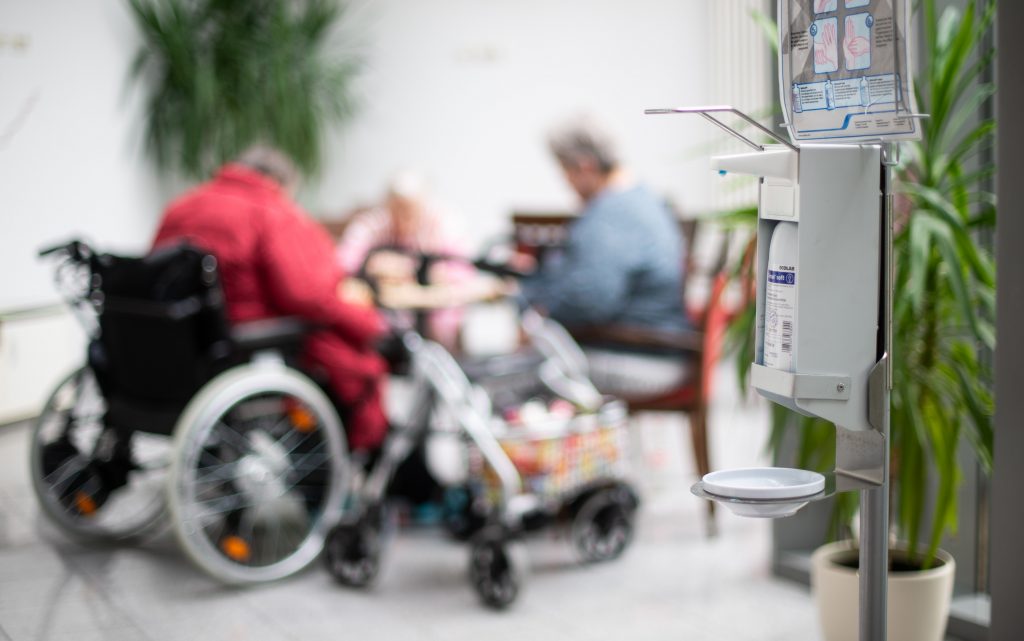
Staring July 1st, all Ontario long-term care homes will be required to have COVID-19 vaccination policies in place for staff, the Ministry of Long-Term Care announced on Monday.
The new policies will provide staff with three options: They can either provide proof of vaccination, proof of a valid medical exemption for the shot, or be required to take an educational course about the benefits of the approved vaccines, and the risks of not being vaccinated.
Ontario will become the first province in Canada to make such a policy mandatory.
“The vast majority of long-term care staff have embraced vaccination to protect their residents. For those without medical issues who are still reluctant, a mandatory education program will be helpful to correct misinformation and alleviate their concerns,” the Ontario Long-Term Care Association said in a release.
Associate Chief Medical Officer of Health, Dr. Barbara Yaffe, applauded the move on Monday during the province’s regular COVID-19 update.
“It’s a good idea,” she said. “It certainly makes sure that people have the info to make an informed decision.”
Yaffe also hinted that vaccination policies could become more widespread beyond long-term care homes.
Western University announced last week that it will require students living in residence to be vaccinated against COVID-19 come September.
Yaffe commented on Western’s policy saying, “I think it will help a lot with the residents in particular because if there is a case, there will be a lot less risk of transmission because people are immunized and there will be much better records about who is immunized and who isn’t.
“I see there is potential for this kind of thing being used in other settings,” she added.
“In terms of employees you cannot require somebody to be vaccinated … but you can require them to provide proof if the policy of the institution is they have a choice — vaccinate, exemptions, or education. I see this as a very positive trend.”
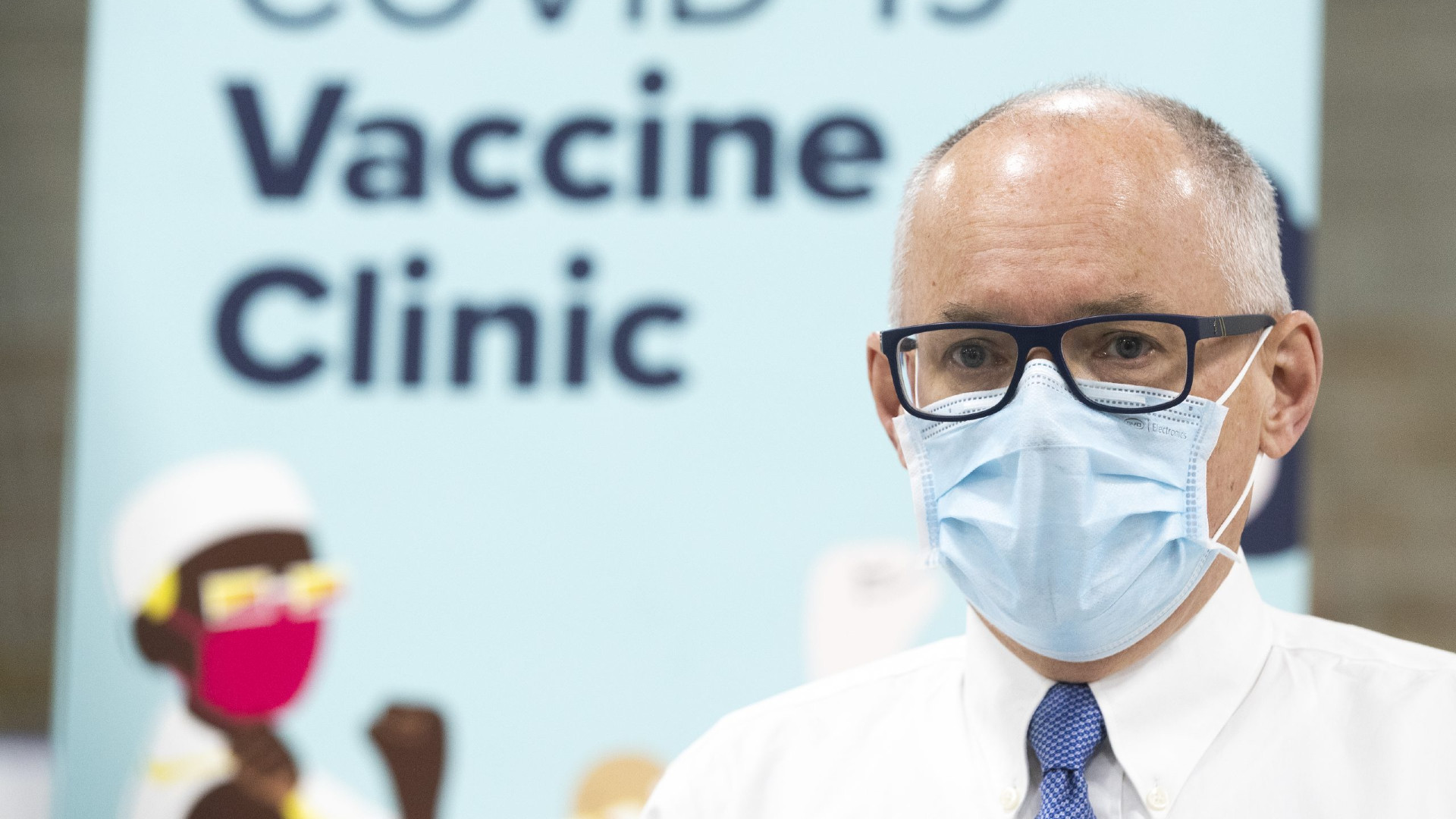
The doctor who will guide Ontario’s path out of the COVID-19 pandemic is being described by colleagues and friends as a competent public health expert, straight shooter and excellent communicator.
Dr. Kieran Moore, who is currently the medical officer of health for Kingston, Frontenac, Lennox & Addington Public Health, is set to replace Dr. David Williams as Ontario’s top doctor on June 26.
The province said it was Moore’s success in guiding Kingston and 10 other municipalities throughout the pandemic that led to his hiring.
Bryan Paterson, the mayor of Kingston, Ont., said he never worried about public compliance over tough public health orders because he had “one of the best” in his corner.
“When you ask him a question, he’ll give you a straight answer,” Paterson said on Monday.
“I think his communication skills are second to none. It’s one thing to be an expert and have knowledge, but it’s another thing to be able to indicate it in layman’s terms.”
Paterson credits Moore for pushing the province for a regional approach in lifting its restrictions and has recently been advocating for schools in his region to be able to reopen as soon as possible.
Moore has been at the helm of Kingston, Frontenac, Lennox & Addington Public Health since 2017 and the associate medical officer of health before that since joining the agency in 2011.
He has become known locally for his YouTube videos in which he explains, in plain language, complex medical topics and the reasons behind some of his public health decisions.
He stands in the videos next to a long sheets of paper draped over a white board. Different points are marked by different colours, and he methodically goes through each, like a teacher in front of a class.
“That was very, very successful because when you’re pitching to the public, you have to pitch it at a level that everybody can understand,” said Dr. Gerald Evans, the medical director of infection prevention and control at Kingston Health Sciences Centre.
The pair have known each other for two decades.
“People loved it,” he said.
The mayor said while many challenged him on various orders and initiatives designed to curb, or prevent the spread of COVID-19, the voices got quieter after listening to Moore explain the rationale.
“It’s really his ability to just speak to an average person and explain the risks and explain the reason for public health restrictions, I think, has really helped to create that buy-in here locally,” Paterson said.
Moore has helped bring in mask-wearing to the region much earlier than the provincial mandate, enforced strict gathering limits designed to stifle massive parties in the city around St. Patrick’s Day, and ordered the closure of hair salons after a major COVID-19 outbreak last summer.
“Like a good chess player, Kieran is always looking several plays ahead,” said Denis Doyle, the chair of the local board of health.
There are only 11 active cases of COVID-19 in the region that serves nearly 214,000 people. Only three people have died from COVID-19, and, notably, none in long-term care.
Colleagues say Moore is a great choice to lead the province out of the pandemic, in part, because of his varied background.
He spent years as an emergency physician in Kingston and brought his innovative mind to the job, said Evans.
Moore brought in the “emergency department surveillance system” that tracked what patients were coming into hospital with, he said. It was a way to detect, for example, an outbreak of influenza, much more quickly while awaiting lab results.
“It’s very, very useful,” Evans said.
Moore always wanted to figure out a better way to decrease the numbers he was seeing inside hospitals, and felt he had to move upstream to the public health realm, Evans said.
So he went back to school and completed a master’s degree in public health and in disaster medicine.
Many cited Moore’s interest in, and aptitude for, being prepared to how well the region has handled the pandemic.
He, along with Evans, helped organize a meeting with more than 100 health-care experts in February 2020 to discuss how to prepare for the looming pandemic.
“He’s very collaborative and helped bring together public health people and the local hospital doctors to get them up to speed on the science and what we do about it, and that was an incredibly useful thing,” Evans said.
Moore has also worked as a coroner, said Dr. Dirk Huyer, the province’s chief coroner.
“He’s a smart, passionate, energetic and principle-based guy who is proactive in his approach,” Huyer said.
Doyle said Moore has been a tireless advocate on the opioid crisis that has gripped the province in the last half decade.
“We’re still focused on the opioid crisis and we recently passed a motion asking the federal government to decriminalize those who use drugs and we see it clearly as a medical problem and not a criminal problem,” Doyle said.
“We’ve had many more deaths in our region due to opioids than COVID-19.”
Evans said Moore is the perfect choice to lead the province out of the pandemic.
“He’s really quite modest, it’s refreshing, and that will help him transition us out of the pandemic, which is going to be a great challenge,” he said. “But he’s up to the task.”
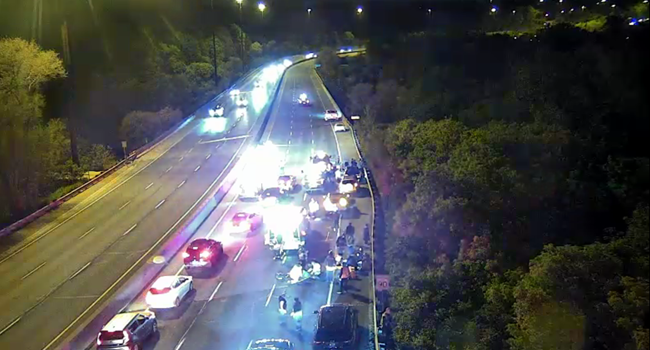
Three people were injured after several motorcycles crashed on the Don Valley Parkway south of Eglinton on Monday night.
Police say they received several calls reporting a crash on the DVP at Don Mills Road shortly before 11 p.m.
Callers reported that several motorcycles were speeding and cutting through lanes and they may have hit the guard rail.
Police, fire crews and paramedics responded to the scene and three people were taken to a trauma centre with serious injuries.
The southbound DVP is closed at Eglinton Avenue East. Delays are expected and police are asking drivers to take alternate routes while the investigation takes place.
